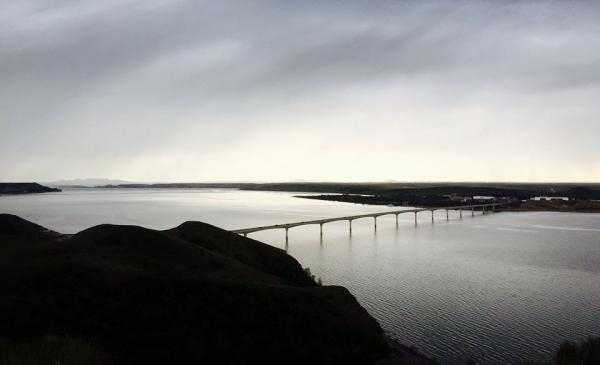
- Details
- By Darren Thompson
WASHINGTON — On Friday, March 19, 2021, the Department of Interior reversed a Trump-era decision that determined a portion of the Missouri River on the Fort Berthold Indian Reservation would belong to the state of North Dakota.
Previously, the land belonging to the Three Affiliated Tribes (Mandan, Hidatsa, and Arikara) was upheld through the 1825 and 1851 Treaties, subsequent Executive Orders, a clear, binding decision by Interior’s Board of Land Appeals in 1979, and Solicitor legal opinions in 1936 and 2017.
Today, the Mandan, Hidatsa and Arikara Nation said in a statement that it fully supports the Department of Interior’s decision to reject a 2020 opinion by former Solicitor Daniel Jorjani that illegally sought to take away the MHA Nation’s ownership.
“Prior to the false Jorjani opinion, the U.S. government had consistently affirmed MHA Nation’s property rights to the minerals below the Missouri River numerous times throughout history,” said MHA Tribal Chairman Mark Fox in a statement.
“We are pleased the federal government has chosen to follow the law and withdraw the false Jorjani opinion which sought to illegally take away the MHA Nation’s property rights to the Missouri River bed within the Fort Berthold Reservation,” said Chairman Fox. “This is the right decision”
The Interior’s Principal Deputy Solicitor Robert T. Anderson issued a withdrawal of the Trump administration M-37056 Opinion, issued on May 26, 2020.
“The previous administration’s M-Opinion overturned decades of existing precedent holding that the Missouri riverbed belonged to the Mandan, Hidatsa, and Arikara (MHA) Nation. Today’s action will allow us to review the matter and ensure the Interior Department is upholding its trust and treaty obligations in accordance with the law,” an Interior spokesperson said in a statement.
In the Interior memorandum, Anderson says the flooded uplands are held in trust for the benefit of the Mandan, Hidasta and Arikara Nation.
In July 2020, the Three Affiliated Tribes sued the U.S. government in the District Court for the District of Columbia, due to the Department of the Interior’s failure to complete title and mapping work in a portion of the Missouri River riverbed.
The Court granted the Interior Dept. a stay to review the Trump administration’s opinion.
“The MHA Nation’s rights to the Missouri River riverbed minerals have been reaffirmed through a history of longstanding, well-settled, and still applicable legal precedents, and there should be no question as to the validity of the Nation’s claims,” said National Congress of American Indians (NCAI) President Fawn Sharp.
“I call on officials of the State of North Dakota to respect and accept the Department of Interior’s rightful decision here, and to stand down on their efforts to take for themselves that which has for centuries belonged to our people,” Chairman Fox said.
“Our people have waited so long for this,” MHA Tribal Member and former MHA Times Editor Vonnie Alberts said to Native News Online. “It’s been in black and white all along, but overlooked by the previous administration for other’s personal gain.”
The decision comes within days after Laguna Pueblo Debra Haaland was sworn as the first American Indian Interior Department secretary, becoming the first American Indian to serve in any president's Cabinet in US history.
More Stories Like This
Native News Weekly (August 25, 2024): D.C. BriefsUS Presidents in Their Own Words Concerning American Indians
Native News Weekly (December 14, 2025): D.C. Briefs
Wounded Knee Massacre Site Protection Bill Passes Congress
Two Murdered on Colville Indian Reservation
Help us defend tribal sovereignty.
At Native News Online, our mission is rooted in telling the stories that strengthen sovereignty and uplift Indigenous voices — not just at year’s end, but every single day.
Because of your generosity last year, we were able to keep our reporters on the ground in tribal communities, at national gatherings and in the halls of Congress — covering the issues that matter most to Indian Country: sovereignty, culture, education, health and economic opportunity.
That support sustained us through a tough year in 2025. Now, as we look to the year ahead, we need your help right now to ensure warrior journalism remains strong — reporting that defends tribal sovereignty, amplifies Native truth, and holds power accountable.
 The stakes couldn't be higher. Your support keeps Native voices heard, Native stories told and Native sovereignty defended.
The stakes couldn't be higher. Your support keeps Native voices heard, Native stories told and Native sovereignty defended.
Stand with Warrior Journalism today.
Levi Rickert (Potawatomi), Editor & Publisher
